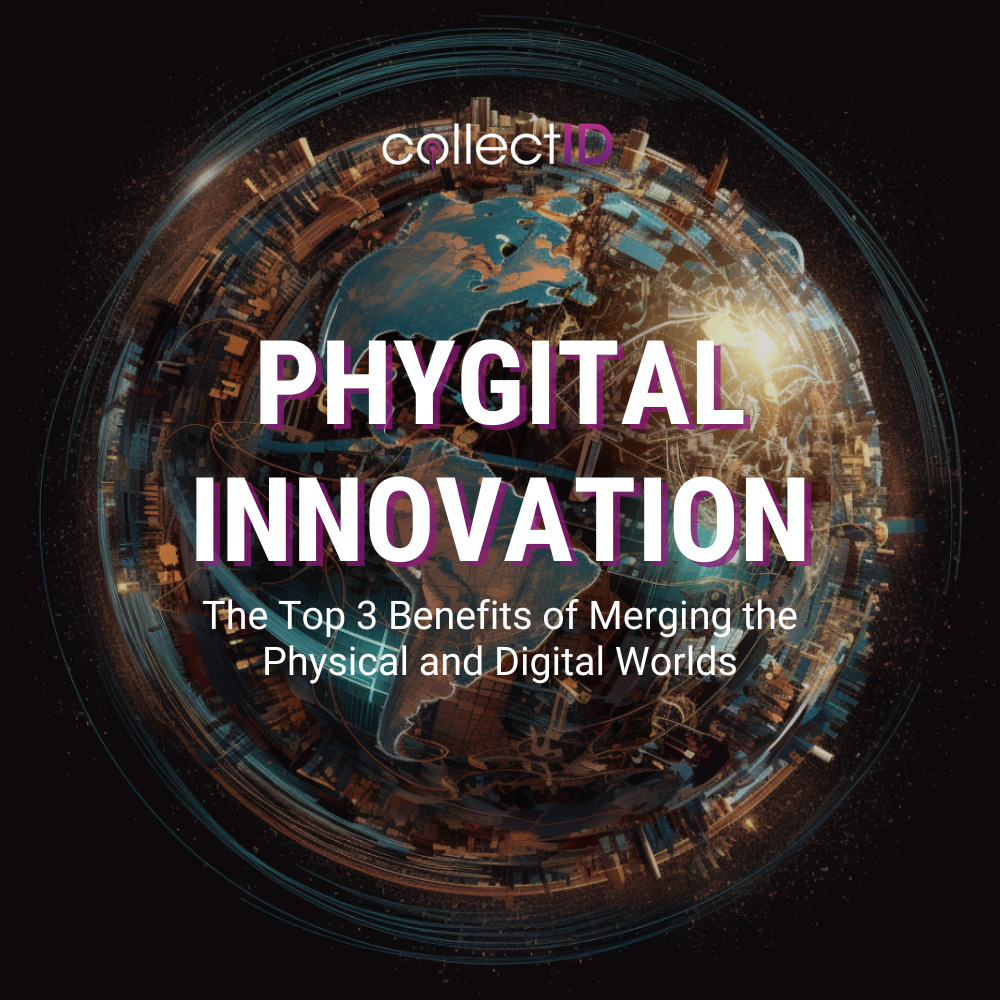Phygital tech is blasting through traditional customer-business interactions, fusing physical items with their digital counterparts to provide enhanced value and tailored experiences. In this post, you’ll learn what phygital is, what it does, and how it’s shaking up different industries.

What does Phygital mean?
As the name suggests, phygital is the combination of physical and digital. While a newer marketing buzzword, phygital is increasing in popularity to describe the seamless, dynamic experiences that occur when the physical and digital worlds are combined.
The phygital technologies that are growing in popularity across all industries include augmented reality (AR), virtual reality (VR), Internet of Things (IoT), Near Field Communication (NFC), interactive kiosks, and wearable technology.
How Does Phygital Transform What We Know About the Physical and Digital Worlds?
Phygital blends the sensory feel of physical items with the convenience of digital platforms, elevating brand-customer interactions.
In the past, a purchase was limited to a physical store or online retailer, but now more and more businesses are striving to provide the ultimate phygital experience for their customers. By blending the benefits of both worlds, companies can provide a seamless and dynamic experience that creates a more engaging and interactive atmosphere, ultimately resulting in increased customer satisfaction and loyalty.
The Benefits of Going Phygital
With the personalized, emotional experiences phygital brings, businesses can:
Access Customer Behavior Data
Using phygital technology opens the door to customer data that allows businesses to better understand who their customers are and what products they’re buying.
For example, various sports clubs are beginning to integrate NFC tags into their jerseys, providing fans with an immersive experience when they interact with their jersey. The data collected from this technology provides clubs with a better understanding of customer preferences and behavior, allowing for more targeted marketing efforts in the future.
Build Brand Loyalty
Phygital technology creates opportunities for brands to introduce gamification and loyalty benefits. For example, a retail brand could use AR technology to create a scavenger hunt in their physical store, where customers use their mobile devices to search for clues and collect rewards. By providing customers with personalized and convenient experiences that enhance their relationship with the brand, phygital technology can strengthen their emotional attachment and long-term commitment.
Boost Sales
Brands can increase sales through phygital technology by providing direct offers and promotions that are available at customers’ fingertips through digital channels like mobile apps. This convenient and personalized experience improves the overall customer experience and creates a channel for repeat business.
What Industries are Starting to Embrace the Phygital Trend?
Sports
The sports industry has embraced phygital technology as a way to enhance the fan experience and drive engagement. From virtual reality (VR) experiences that allow fans to feel like they are on the field to augmented reality (AR) apps that enhance the in-stadium experience, the integration of physical and digital elements has revolutionized how sports are consumed. Additionally, digital platforms have allowed for personalized experiences and the ability to connect with athletes and teams on a deeper level, bringing fans closer to the game and players than ever before.
The Nashville Predators, for example, released a limited edition jersey last year in celebration of Pekka Rinne’s retirement and each jersey had collectID technology integrated so that when owners tapped the jersey with their smartphone, they unlocked behind-the-scenes footage and a special message from Pekka Rinne.

Another interesting example of a sports club that used phygital technology is a professional soccer club from Germany, FC Cologne. The club integrated collectID technology into scarves, which fans could use as their ticket into the stadium. Additionally, the club was able to offer exclusive content and promotions in real time on matchday.
Media and Entertainment
The media and entertainment industry is leveraging phygital technology to enhance the customer experience and bring fans even closer to their favorite artists and performers. Coachella Valley Music and Arts Festival, for example, incorporates augmented reality (AR) into its experiences, allowing attendees to interact with digital overlays of artwork and other festival elements using their smartphones.

Additionally, the festival has also utilized virtual reality (VR) technology to offer immersive experiences, such as a VR tour of the festival grounds and performances from various artists. These phygital elements add an extra layer of engagement and excitement to the festival, enhancing the overall attendee experience.
Retail
In the retail space, businesses are leveraging phygital technology to create interactive shopping experiences that bring together the convenience of online shopping with the tactile experience of trying on clothes in-store. For example, some retailers are implementing virtual reality (VR) technology that allows customers to try on clothes in a digital environment, helping them to make more informed purchase decisions.
Nike is an example of a retail company that uses this technology. Their Nike App uses features like augmented reality to see how shoes would look on their feet. They also have physical retail stores with interactive digital displays that offer personalized recommendations and allow customers to customize products. Additionally, Nike acquired RTFKT in 2021, which allows customers to purchase sneaker NFTs and link them to physical sneakers, allowing customers to wear them in the Metaverse and attend virtual meetings.
Hugo Boss is also beginning to introduce this kind of technology in their brand. They recently collaborated with Imaginary Ones to release a limited edition baseball cap, which owners could purchase, wear in the Metaverse, and receive exclusive content directly through the digital twin of the cap.
Hospitality
In the hospitality industry, phygital technology is being used to enhance customer experiences through personalized recommendations, mobile check-in, and keyless room entry. By collecting and analyzing data on customer preferences, hotels are able to provide personalized recommendations for things like dining and entertainment, and can use mobile check-in and keyless room entry to streamline the check-in process for guests.
Accor is an example of a hospitality company that uses phygital technology to enhance the guest experience. Their “Accor Key” program allows guests to use their smartphones as room keys, eliminating the need for physical keys and making the check-in process faster and more convenient.
Challenges to Consider When Going Phygital
Though integrating physical and digital systems requires significant investment, the rewards are worth it. Businesses need to prioritize their digital infrastructure and train employees to use the new technology to full effect. With any new technology in today’s digital age, privacy concerns are also pertinent and should be taken seriously. Going in with a strategy and working with a team of experts can help tackle these challenges and set your company up for success.
How to Get Started with Phygital
Start by identifying the best technologies to leverage for your industry and customer base, and then invest in a robust digital infrastructure. Train your employees to effectively use the new technologies, and you’ll be sure to ride the phygital wave with success.
Phygital technology is transforming how brands interact with customers, offering unique, personalized experiences that bridge the two worlds. Even with the challenges, the benefits are undeniable: going phygital helps businesses understand their customers better, build brand loyalty, increase sales, and stay ahead of the curve. Give it a shot and contact our team today.















